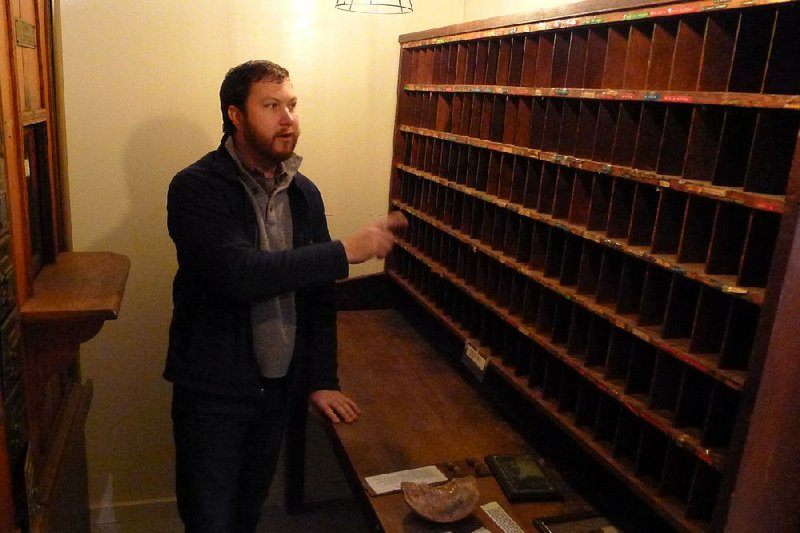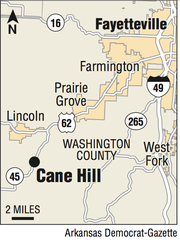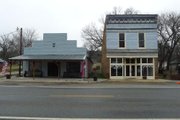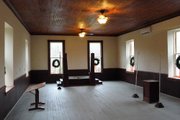CANE HILL -- Two historic buildings have been restored in this Washington County town, and work is to begin on another two next year.
Restoration work is basically done on the 1900 A.R. Carroll building and the 1940s Shaker Yates Grocery building, said Bobby Braly, executive director of Historic Cane Hill Inc.
Next year, work will begin on the 1886 Cane Hill College building and the 1834 Methodist Manse, he said.
A large restoration effort is underway in this community of about 200, which is historically significant as one of Arkansas' first college towns.
Braly said that from a historical perspective, it's "great" that modern development largely passed by Cane Hill, which is 20 miles southwest of Fayetteville on Arkansas 45.
"We've been very fortunate because it still looks a lot like it [always] did here," he said, referring to the early 20th century.
Cane Hill has 16 buildings on the National Register of Historic Places. If it had grown like Prairie Grove, which is 8 miles to the northeast on the more heavily traveled U.S. 62, half of those 16 buildings would probably have been lost to development, said Braly.
Cane Hill was settled by Cumberland Presbyterians from Crystal Hill in 1827. Braly said Cane Hill School began in 1834 and Cane Hill College opened in 1852, the same year Cane Hill Female Seminary began in the community of Clyde, 1.5 miles to the south.
Most of Cane Hill College was burned by Union troops during the Civil War. The college closed during the war and reopened in 1865. A decade later, it merged with Cane Hill Female Seminary.
The only Cane Hill College building that survived the war was burned by an arsonist in 1885, said Braly. It was rebuilt the next year as a two-story brick building, and classes began there in 1887. After Cane Hill College closed in 1891, the main building served as a public school until the 1950s.
Tim Leach of Midland, Texas, chief executive of Concho Resources Inc., is financing much of the restoration, according to a news release from Scott F. Davis, who was president of the Cane Hill College board of trustees. Leach has family roots in the Cane Hill area.
Jerry Leach, Tim Leach's father and a board member of Historic Cane Hill Inc., said his son doesn't want any attention for his efforts. Donations are still being accepted, Jerry Leach said.
A Lincoln native, Braly moved from Tennessee to Cane Hill in September 2013 to oversee the restoration. He's an anthropologist specializing in archaeology.
The A.R. Carroll building served as a drugstore until probably the 1930s, said Braly. Now, the first floor is meeting space and the upstairs, which had been a Masonic Lodge, will house space for artists, said Braly. While the restoration of the Carroll building is basically complete, wrought-iron porch brackets and two roof finials will be added next year, said Braly.
The Shaker Yates Grocery building will serve as the Historic Cane Hill Museum while restoration work is being done on the Cane Hill College building, he said.
The museum has been moved from the second floor of the college building to the grocery building, where displays are still being set up. The displays, which are all Cane Hill specific, include pioneer furniture, college memorabilia, a 4,500-pound bank safe and mailboxes from the old post office. Braly said the museum will reopen in its new location in March.
The museum will initially be open from 10 a.m. to 2 p.m. every Saturday. In the college building, the museum was open only three days a year, during the annual Cane Hill Harvest Festival.
Work on the college building and the manse will be considerably more involved than it was at the two buildings restored this year.
Braly said work on the college building will take two years and cost more than $1 million. One of the main problems is the foundation.
"You've got to stabilize the foundation," he said. "That's where all the cracks in the brick are coming from."
The building also needs roof repairs, masonry work, installation of a front door and windows that look like the original ones. Somewhere along the way, the front door was bricked in and a side door became the main entrance.
Kinco Constructors of Springdale will be renovating the college building, said Braly.
The Methodist Manse needs a considerable amount of work, including a new roof. The old roof was removed this year.
"There is no roof," said Braly. "It's down to a shell."
Braly said it'll take a year to restore the manse. No contractor has been chosen yet for that project, and Braly said he has no estimate of the cost of the building's restoration.
Originally built as a church, the manse building served as a Union headquarters during the Civil War.
The battle of Cane Hill was fought nine days before the Battle of Prairie Grove in 1862, resulting in a Union victory that forced Confederate troops miles out of Cane Hill, said Braly.
Braly said there's much to do by 2027, which is the 200th anniversary of Cane Hill. Besides the restoration of several buildings, there will be walking trails and efforts to increase public education, he said.
Braly said the restoration has put about 20 local people to work full time.
"One of our mandates is to hire local people," he said.
Metro on 12/26/2014



